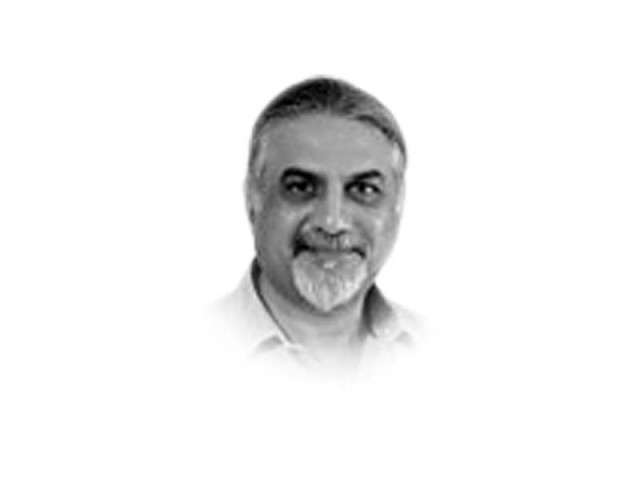Our century of humiliation?
Pakistan’s economic efficiency cannot be attained through political power but rather at the cost of it

The political systems of China and Pakistan and the processes by which they make decisions concerning their states are unquestionably very different. But the notion of similarity in how China has risen and how Pakistan is attempting to rise under not-so-unfamiliar circumstances is hard to miss.
Pakistan re-visions the furtherance of its national interests and its future after being deeply embroiled in two Afghan wars for an extended period of over 40 years. China’s hundred years of humiliation had resulted in its awakening and the forty years that we spent fighting the Afghan wars, which later transformed into a greater War on Terror (WoT) in which the entire world participated, has awakened us as a nation from our deep slumber. And this post-war awakening in Pakistan has created a national realisation (at least at the academic and policymaking level) about our social, economic and political disconnect. If we don’t wake up now, we may also look back at the 21st century and celebrate it much like China did as our century of humiliation.
The imperial subjugation of China was conventional; the war imposed on us by our enemies is hybrid in nature. The hybrid components of the Afghan conflict include terrorism, promoting insurgencies, use of improvised explosive devices, disinformation, cyber warfare, disinformation, etc. This makes the challenges we face very different from the challenges that China faced. The ripping apart of China by the imperialist powers during the century of humiliation seems quite similar to the way the WoT has ripped apart the socio-economic fabric of our country and given rise to hopelessness and unnecessary frustrations. The state also faces the birth and rise of many social and political movements, which slow down their ability to govern and progress at a rapid pace.
When the civil war ended in China and the country finally united under the communist rule, it had to suffer the enmity of both the US as well as the Soviet Union since the Sino-Soviet alliance had collapsed in 1960. The extreme Indian hostility that we face today is not surprising but it is our gradually “collapsing relationship” with the US that is putting greater strain on our new takeoff plans, strategies and policies. Our growing alliance with China further pushes the US and our archrival India to cement their relationship and dye it permanently into an explicit anti-China and anti-Pakistan cast.
Then there is this unresolved issue of Taiwan for the Chinese and IIOJK for Pakistan. Mao said he was not in a hurry and gave his regime 100 years to recover Taiwan but President Xi Jinping considers “passing the problem from generation to generation” unacceptable. He has not set a clear date for its resolution but considering that the rest of the world powers are already pivoting towards Asia-Pacific, any desire of resolution of the conflict might result in a new contestation — with Pakistan likely to side with no one else but China.
Much like Taiwan, the IIOJK issue for Pakistan also simmers. As much as the unresolved issue of Taiwan creates strategic anxieties for China and the world, the unresolved issue of IIOJK does the same in South Asia. The clash of the Western civilisation with the Islamic civilisation after the humiliating withdrawal of US forces from Afghanistan is now taking a backstage and the entire world is looking at Asia-Pacific as the new battleground for upcoming conflicts. What is our leadership doing about it?
China was poor; it was isolated and surrounded by threats. Yet leaders like Mao, Deng Xiaoping and Xi Jinping worked to build a geo-economic and geopolitical environment that enabled China to push back threats and utilise its immense national economic potential to ride the great momentum of globalisation.
Pakistan in the last four decades has also experienced relative poverty and, much like China, unwelcoming international isolation. But what actually has kept our head down has been our forty years of “Afghan war participation”. Our military did well to push back the threats but our political leadership and their political philosophy driven by the “lust for power” created more threats from within. Thus, it was not a surprise that we as a state waved at the information age from the sidelines as it passed by, not because we lacked a national enthusiasm but because we were too pre-occupied in forming new governments — five different governments were formed in the 90s decade including a military government — and in fighting multiple hybrid enemies created as a result of the Afghan wars.
China was poor but not politically unstable when it poised itself for productivity. Today, Pakistan is also fighting to achieve the same political stability that enabled China to introduce economic reforms. In China, economic efficiency was enabled by strong political power rooted in centralised political leadership. Is this the same in Pakistan? Politically, we are knee-deep in a make-or-break decisive decade. Politicians in Pakistan exaggerated, inflated and overstated their innocence in trying to defend their cases. Their return to moderate positions is necessary but it seems impossible.
What is different about China and Pakistan is that our politics lacks the patience, realism and much-needed moderation to find the middle path. It is therefore not difficult to make the assessment that with politics in its current shape, Pakistan’s economic efficiency cannot be attained through political power but rather at the cost of it.
Published in The Express Tribune, November 21st, 2021.
Like Opinion & Editorial on Facebook, follow @ETOpEd on Twitter to receive all updates on all our daily pieces.















COMMENTS
Comments are moderated and generally will be posted if they are on-topic and not abusive.
For more information, please see our Comments FAQ